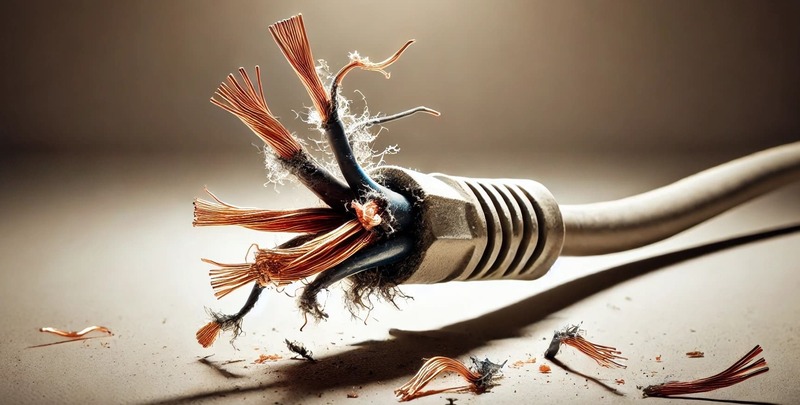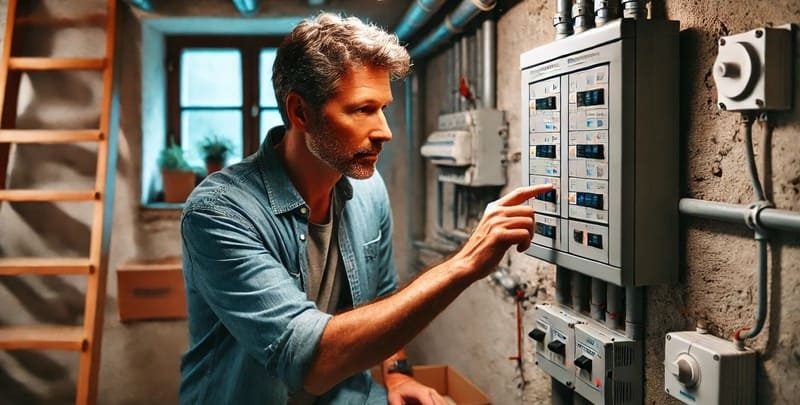The Hidden Perils of Uncovered Wiring
When it comes to the safety of your home, exposed wires are more than just a cosmetic issue—they represent a real threat. Aging electrical systems, botched DIY projects, or general wear and tear can all lead to exposed wiring, which poses significant risks to both your property and your loved ones.
From electric shocks to fire hazards, neglecting exposed wires can have dire consequences. Many homeowners underestimate how quickly a seemingly minor problem can spiral into something much more serious—and costly. It's crucial to address exposed wires as soon as they're detected to prevent accidents or potential legal trouble if safety regulations are breached. In this article, we'll delve into the dangers associated with exposed wires and outline steps you can take to safeguard your home from these hidden threats. After all, safety should always be the number one priority when dealing with electricity.
Electric Shock and Burn Risks
Exposed wires within your home can result in dangerous electric shocks and burns, posing a significant threat to anyone nearby.
There are several key dangers you should be mindful of:
- Direct contact: Touching an exposed wire can lead to painful—or even fatal—electric shocks. This is especially perilous for children and pets who might not recognize the danger.
- Burns from electric currents: Contact with exposed wires can sometimes cause severe burns as the electric current passes through the body. These burns may appear at the point of contact and often require medical treatment.
- Metal object interaction: Tools, jewelry, or appliances made of metal can accidentally touch exposed wires, making it easier for electricity to travel through the metal and cause a shock.
- Hidden hazards: Wires hidden behind furniture or walls can go unnoticed, increasing the chance of accidental contact.
Taking immediate action to resolve exposed wires can help prevent these dangerous scenarios and ensure everyone in your home remains safe from electric shocks and burns.

Fire Hazards
One of the gravest concerns regarding exposed wires in your home is the risk of fire. Damaged or frayed wires lose their insulation over time, leaving live wires exposed. These exposed wires can spark when they come into contact with other materials like wood, drywall, or even other wires. Over time, this can lead to small electrical fires that may go unnoticed until they grow into full-scale house fires.
Often, exposed wires are concealed behind walls or in hard-to-reach areas, making it challenging to spot the issue before it becomes critical. Electrical fires spread rapidly and can be difficult to manage. Statistics show that faulty wiring is among the leading causes of house fires. To mitigate these risks, it’s vital to routinely inspect your home’s wiring, particularly in older homes, and address any issues without delay. Always call a certified electrician to repair exposed wires and minimize the risk of electrical fires in your home.
Short Circuits and Equipment Damage
Exposed wires can lead to short circuits, damaging your electrical equipment and potentially resulting in costly repairs. Here's how:
- Short circuits: When exposed wires touch each other, they can create a short circuit, allowing electricity to flow along an unintended path. This can cause overheating, tripped circuit breakers, or even a fire.
- Appliance damage: A short circuit caused by exposed wires can send a sudden surge of electricity through your appliances, damaging their internal components. This can ruin expensive devices like refrigerators, TVs, or computers.
- Recurrent failures: Appliances and electrical systems exposed to frequent short circuits may experience repeated malfunctions or breakdowns, shortening their lifespan and necessitating more frequent repairs.
- Higher energy costs: Wiring issues causing short circuits can make your appliances less efficient, consuming more energy than necessary and increasing your electricity bills.
To avoid these issues, it’s essential to fix exposed wires promptly. Regular electrical inspections can also help prevent short circuits and equipment damage, ensuring your home’s electrical systems operate safely and efficiently.
Increased Risk of Electrocution in Moist Environments
Exposed wires in damp areas of your home, such as bathrooms, kitchens, or outdoor spaces, present an even greater risk of electrocution. Water is an excellent conductor of electricity, meaning that if exposed wires come into contact with water, the risk of electrical shock rises significantly.
Even something as simple as a dripping faucet or splashed water near an exposed wire can create a hazardous situation.
In locations like kitchens or bathrooms, where electrical outlets and appliances are frequently near water sources, the danger is particularly high. Outdoor areas are also risky, especially during rain or when sprinklers are running. If someone touches the exposed wire or any water it has interacted with, they could suffer a severe electric shock.
This is why it’s imperative to address any exposed wiring, especially in high-moisture zones, as soon as possible. Installing Ground Fault Circuit Interrupters (GFCIs) in these areas can offer an additional layer of protection, but fixing exposed wires should be your top priority for safety.
Legal and Regulatory Concerns
Exposed wires in your home aren’t merely a safety concern—they can also lead to legal and regulatory challenges. Electrical codes exist to ensure the safety of your property and its occupants, and failing to comply with these standards can result in fines or penalties.
As a homeowner, you are responsible for maintaining safe electrical systems. Ignoring exposed wires can violate local building codes, particularly if the issue leads to a fire or injury. This is especially relevant if you plan to sell your home—potential buyers or inspectors will flag exposed wires, which could delay the sale or reduce your property’s value. In rental properties, landlords are legally obligated to provide a safe environment, and exposed wiring can lead to tenant disputes or legal action.
To avoid these complications, it’s essential to address any exposed wires immediately and hire a licensed electrician to fix them. Staying compliant with electrical safety regulations not only protects your home but also keeps you on the right side of the law.

How to Handle Exposed Wires Safely
If you discover exposed wires in your home, it’s important to approach the situation carefully to prevent accidents.
Here’s what you should do:
- Switch off the power: Before taking any action, locate your home’s electrical panel and turn off the power to the affected area. This eliminates the risk of electrical shock.
- Avoid touching the wires: Never handle exposed wires with your bare hands, even if you believe the power is off. Use insulated tools or, better yet, leave it to a professional.
- Keep people and pets away: Ensure children and pets stay clear of the area until the wires are safely addressed.
- Call a licensed electrician: Exposed wires should always be handled by a certified electrician. They will assess the situation, repair the wires, and guarantee your home meets safety standards.
- Temporarily cover with insulating materials: If the wires are in a high-traffic area, you can temporarily cover them with electrical tape until a professional arrives.
Acting swiftly and safely when encountering exposed wires helps prevent electric shocks, fires, and other hazards in your home.
Make Safety a Priority – Protect Your Family
Exposed wires in your home are a serious hazard that should never be ignored. Whether they result in electric shocks, fires, or damage to your appliances, the risks are far too great to overlook.
Regularly inspecting your home’s electrical system and addressing any exposed wiring can save you from costly repairs, legal issues, or worse—endangering your family.
If you ever come across exposed wires, always prioritize safety by switching off the power and contacting a licensed electrician to resolve the issue. Don’t rely on quick fixes or DIY attempts when it comes to electrical work.
By staying proactive, you can keep your home safe and prevent accidents before they occur. When it comes to electricity, safety should always come first.
Note: This information is provided for guidance purposes only. Regulations vary by region, so please consult your local authorities or a professional before undertaking any work. For more details, see our Terms & Conditions.
Ro Water Purifier,Reverse Osmosis System,Osmosis Water System,Osmosis Water Machine
Changzhou Senjie Environmental Protection Equipment Co., Ltd. , https://www.senjie-hb.com
